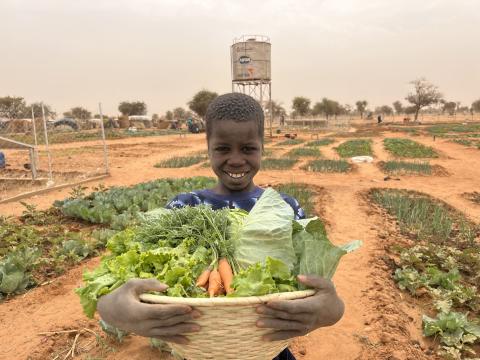Market garden site transforms lives of IDPs in Niger

“It was under the threat of death that we fled and left our fields and all our possessions including food, animals and even household materials. Everything stayed there,” said Hama one of the internally displaced people who live in Garbey Kourou in Niger.
Once a small, anonymous village in the Gotheye department of the tri-border zone, Garbey Kourou is now an area of humanitarian concern. In fact, the scale of the terrorist crisis is growing by the day and its effects are gradually spilling over into the surrounding areas.
As Mahamane Salissou Yahaya, ADH project coordinator, says, it should be “remembered that the community of internally displaced people arrived in Garbey Kourou by the effect of insecurity ... and it is in this fragile context that having abandoned their villages and their possessions, they came to stay here”.
Those IDPs found themselves very vulnerable, with no resources and no economic or income-generating activities.
In several waves, these victims of insecurity arrived in Garbey Kourou where they faced chalenges like access to decent shelter, to Water and sanitation infrasctruture, or to food proved to be insurmountable challenges. “Here we had nothing to eat and the water we had was that of the Sirba River which had been causing us illnesses such as stomach aches and diarrhea since our arrival. We had no shelter and it was cold and windy like we had never experienced. We have been living in this suffering ever since,” confides Ali Issa, an internally displaced people from the village of Tchambi.
"We suffer from lack of toilets here. There are no toilets here in the IDP camp. To relieve ourselves, we all go into the bush to do it in the open air, running the risk of insecurity. There are bandits in the bush and there are also dangerous reptiles like snakes and scorpions that bite especially at night. We really need toilets here,” adds Aïssa Harouna, another IDP.
For Seydou Harouna, a native of Garbey Kourou, “for several years, we have been experiencing very difficult and deficit agricultural seasons. These are just seasoning with early rain stops and which end with bitter tastes for us. Many farmers harvested nothing last winter season. It was in conditions of extreme food insecurity that the terrorist crisis also arose. Many people fled their villages and came to stay here in Garbey Kourou, thus increasing our food crisis and our vulnerability.” All these people are now without any economic activity and without fields to work.
In this context, World Vision and its partner ADH came to the aid of these displaced people through the Integrated Emergency Food Security and Nutrition for Internally displaced people and Vulnerable Populations in Mali and Niger project. Recognising that the situation was still evolving and that it would be very difficult for them to return to their villages of origin, the project initiated these resilience and early recovery activities for them. The ADH project is now developing a three (3) hectare horticultural site for the benefit of 200 households, including 140 IDPs and 60 indigenous households who have experienced the shocks of the security crisis and have left everything they owned and their original village.
“After several amounts of help in cash and in kind, World Vision asked us to find a piece of land that it can be developed as a vegetable garden for us. I thus gave freely away my field which previously produced almost nothing. So today there are 200 households conducting vegetable production in this market gardening site. Today these 200 households eat properly and also sell vegetables from this garden. With this garden, we now have less fear of the rainy seasons because we now have another with permanent water for irrigation, safer source of food production for our families,” says Seydou Harouna. `
“This is how the IDPs of Garbey Kourou gain an income source to overcome certain challenges such as food and health care for children,” explains Mahamane Salissou.
Aïssa Harouna, IDP, says that she is thankful for the market gardening site, "our food shortage is over". She added to eat well today, it only requires them to bring ingredients like oil and salt in the garden and use the salad, tomatoes and cabbage that is growing there, prepare their meal and eat.
“We now have another, safer source of agricultural production for our families. Now our food shortage is over, thanks to the market garden site which serves as a field for us to earn our daily food. We really thank World Vision and ADH,” adds Seydou Harouna.